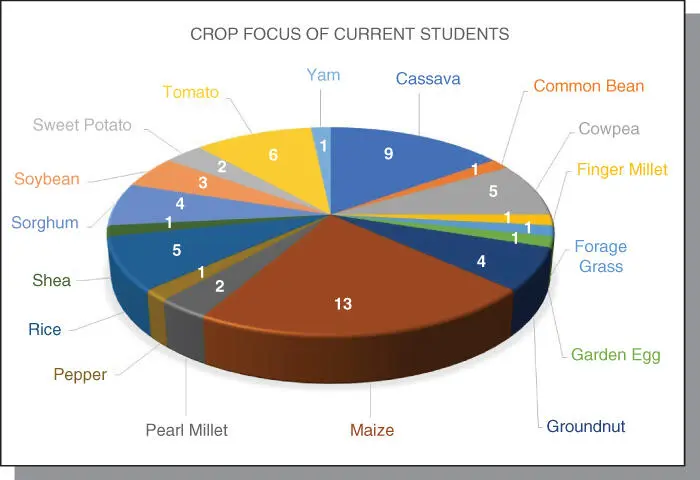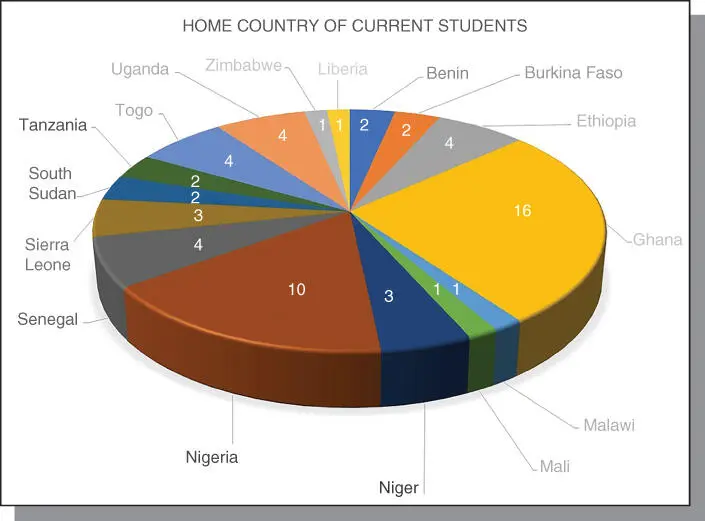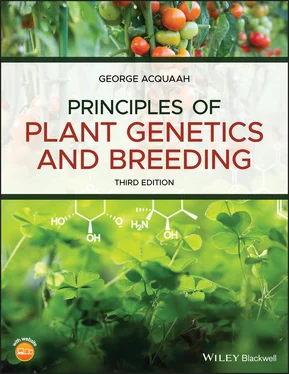Eric Danquah, Samule Offei, and Ronnie Coffman
West Africa Centre for Crop Improvement, University of Ghana, PMB 30, Legon, Ghana
www.wacci.ug.edu.gh
Conversations between academics 1 from the University of Ghana and Cornell University, USA, in the spring of 2006 opened doors for the establishment of the West Africa Centre for Crop Improvement (WACCI) at the University of Ghana in 2007. At the time of the conception of WACCI, the Rockefeller Foundation was also exploring the possibility of replicating the African Centre for Crop Improvement (ACCI), University of KwaZulu‐Natal, South Africa, in West Africa to train plant breeders to serve as the cadres of an alliance needed to spark an African Green Revolution in West Africa through the development of improved and resilient varieties of the staple crops for productivity gains in farmers' fields. The WACCI model is to train plant breeders in Africa, working on African staple crops in African environments, for food and nutrition security in Africa. This model develops excellent scientists specialized in plant breeding and reverses the brain drain syndrome that has plagued Africa. The Alliance for a Green Revolution in Africa (AGRA), which was launched in 2006 in Nairobi, Kenya, following investments by the Rockefeller Foundation and the Bill and Melinda Gates Foundation, accepted a proposal to establish WACCI at the University of Ghana after a scoping study led by Dr. Eugene Terry, formerly of the West Africa Rice Development Association (WARDA) now Africa Rice. Dr. Eugene Terry's report recommended the establishment of West Africa's Africa Centre of Crop Improvement at the University of Ghana and named Dr. Eric Yirenkyi Danquah, a Professor of Genetics at the Department of Crop Science as the Founder and Director for the leadership role he played in the events leading to the establishment WACCI. WACCI was then established as a semi‐autonomous Centre in the School of Agriculture at the University of Ghana in June 2007. The Centre is now one of the constituent units of College of Basic and Applied Sciences following re‐organization of the management structure of the University of Ghana in August 2014. WACCI has evolved into one of the largest institutions for plant breeding education in the world and a model of excellence in Africa to be replicated across the continent.
Overall goal and objectives
The overall goal of WACCI is to improve food and nutrition security in Africa. The approach is to equip plant breeders with the knowledge and skills to develop superior varieties of indigenous crops, using both conventional and modern technologies.
The specific objectives are to:
significantly improve the quality of PhD level training in plant breeding offered to students
create opportunities to develop improved local varieties of the staple crops grown by smallholders in the sub‐regions, using in advances molecular biology, informed by farmers' stated preferences
provide the necessary skills to direct and manage local plant breeding programs to meet local needs, and to respond to indigenous demands
develop breeding techniques appropriate to address some of the unique breeding/crop improvement objectives for the sub‐regions
create a de facto network of functioning plant breeders and their local co‐supervisors from the sub‐regions
Student recruitment and PhD program structure
The student recruitment process is rigorous, requiring the assessment of the student's qualifications, employment history or status, the motivation level, and ability to carry out independent research. During the process of student recruitment, advertisements are sent to all alumni, research collaborators, and scientists within the WACCI‐network across the National Agricultural Research Systems (NARS), as well as posted online. Candidates engaged in plant breeding and who are supported by breeding programs are prioritized in the selection process. Averagely, about 120 excellent applications are received and 11 students have enrolled annually since inception. The PhD in Plant Breeding at WACCI is an innovative four‐year program. The students take taught courses and advanced modules in plant breeding, biometry, genomics, biotechnology, and bioinformatics delivered by UG academics and visiting scientists from advanced plant breeding programs the world over at the University of Ghana in the first year. The students return to their home institutions in the second year to conduct theses research over a three‐year period under the supervision of a team of supervisors including an in‐country supervisors. Mentorship of students is also provided by experts in the area of research of the student. WACCI supervisors visit students at least once a year to monitor progress. The students return to WACCI in the last quarter of the fourth year to complete and submit their theses for examination.
The mode of delivery is student centered and quality assurance procedures are followed; feedback from the students is received each semester for the improvement of the curriculum and the mode of delivery. In 2018, WACCI received international accreditation from the Agency for Quality Assurance (AQAS), Germany, following desk and onsite review of WACCI benchmarked against the standards of the European Union for the two programs, PhD in Plant Breeding and MPhil in Seed Science and Technology.
Initial funding for the establishment of WACCI was provided by AGRA to train 53 plant breeders. To date, funding has been received from over 25 organizations to sustain the WACCI program. Notable contributors include the World Bank Africa Centres of Excellence (ACE) Project the German Academic Exchange Programme (DAAD), the West Africa Agricultural Productivity Programme (WAAPP), the United States Agency for International Development (USAID), Syngenta Foundation for Sustainable Agriculture, EU Intra ACP Mobility Project, and Generation Challenge Program (GCP). In total, funding mobilized to date is about USD 30 million to sustain the program. A notable research grant is the African Union Commission‐European Union grant of USD 1 million focused on crop and soil health improvement for sustainable agricultural intensification toward economic transformation in West Africa.
Student research and breeding programs
The research and breeding work of our students remain a focal point of recognition of the WACCI program. A total of 17 crops have been targeted and remain the focus of our students across Africa since the inception of WACCI. The crops include: yam, cassava, sweet potato, maize, rice, sorghum, finger millet, pearl millet, forage grass, common bean, cowpea, groundnuts, garden eggs, pepper, tomatoes, and shea ( Figure B1.1). These crop‐focused research projects are demand driven by national and regional priorities set by the various institutions across the NARS. Students conduct independent research into country‐specific challenges and develop customized solutions to increase productivity of key staple crops for increased adoption by farmers in students' home countries represented in Figure B1.2.

Figure B1.1The focal crops of PhD Plant Breeding students of the WACCI Programme (2007–2019).

Figure B1.2Home countries of current WACCI students showing student numbers per country.
Читать дальше














